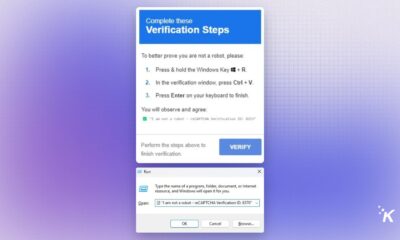Security
Security analysis: Why should cybersecurity be a concern moving forward?
Cybersecurity is one of the most urgent issues to date. Fortunately, there are precautions that organizations can take to limit their chances of being attacked.

Just a heads up, if you buy something through our links, we may get a small share of the sale. It’s one of the ways we keep the lights on here. Click here for more.
As a career field, cybersecurity has never been easy. This is simply because as technology evolves, cyber attackers become more inventive and effective in their security-breaching tactics. But why is this so important?
Throughout the years, the amount spent on cybersecurity continues to grow. In 2014, for instance, the government spent a whopping $71.4 billion to strengthen our online security, which resulted in a growth of 7.9 percent. In 2015, they increased their budget by $75 billion, which resulted in a 4.7 percent increase from the previous year, according to DZone. Perhaps the most shocking thing, however, is that the amount spent on cybersecurity is expected to reach $100 billion by the end of 2018.
This means that organizations are starting to understand that malware is a threat that can’t be avoided and can make anyone – even them – a victim of cyber-attacks. That’s why cybersecurity demands focus and dedication. Things like zero-day attacks, kill chains, and alert fatigue are just a few of the many challenges security analysts face on the daily basis, which is exactly why organizations are now wondering: Is a certificate in ethical hacking enough to keep them safe? A fair question, right? Especially if you want your client’s personal information out of harm’s way. If not, you both could end up being the next victim of a cyber attack. So, why should cybersecurity be a concern moving forward? Let’s take a look.
Cyber Threat Problems Are Everywhere
With cybercrime on the rise, it should come as no surprise to hear that people on the web are more vulnerable than ever to attacks, despite the efforts of government agencies and other security experts. The main cause of this is due to the expanding number of services available online for consumers. Things like online banking, shopping, and bill payments all play a pivotal role in the cat-and-mouse game between security experts and hackers.
Technical innovations have also added to the mix of online threats. The migration of third-party clouds, for instance, has created a collection of personal data that provides more opportunities for criminals to obtain sensitive information just from one target attack. Additionally, online mobile services have opened major corporate systems to more attacks as well. Perhaps the biggest vulnerability that businesses and organizations face, however, is the lack of qualified IT professionals they have on staff.
Think about it, applications – or apps as we know it – that involve the collection and storage of personal data put unnecessary pressure on IT managers. With this mountain of information comes a mountain of responsibility, and one person simply can’t handle this much pressure. So what does the IT manager do?
They hire new employees and put together a team to help manage all this information. Simple, right? Well, not exactly, since not everyone knows how to manage trillions of online documents, and not everyone feels compelled to keep up with the newest technology. This leaves lots of room for error, which means one click or one misplaced document could put everyone’s information at risk. But the threat doesn’t end there.
The development of the internet of things (IoT), puts users at even more risk since it’s designed to enable communication between machines. With the widespread use of machine-to-machine communication, the likelihood of your information being leaked magnifies. Protecting the networks that transport machine-to-machine communication is vital, especially since the communication being shared is typically done without the approval of the user.
Countering Cyber Attacks

Although cybersecurity is considered a board-level responsibility according to Detlev Gabel, there are ways to fight off identity theft with technology. One of the primary things you can do to protect yourself and your organization from online attacks is to keep everything updated. Updating the software you use on the daily basis can help you overcome some of the vulnerabilities that developers try to fix with each new updated version.
Once you’ve updated your software and have all the security systems in place, the next step is testing it. That way, you can find out how efficient your security really is. You should perform durability tests on your devices regularly – weekly, monthly, or quarterly – to identify any weak points and if you’re a Chrome user, no unsecured website will go unnoticed. With the right level of guidance and preparation, it is possible to unconventionally fight crime and recover from a cyber breach.
Another way to use technology to protect yourself is by training your employees. In other words, if you’re an IT manager or manage an organization, you should always conduct annual security training. Invest in activities and workshops that help employees have a better understanding of acceptable security practices, user policies, and make them more aware of security breaches. It’s important to regularly enforce these practices since employees can sometimes drop their guard and stop following these guidelines.
That said, protecting your computer against malware truly is an important security consideration. Businesses shouldn’t only have company policies in place that cover emailing, internet browsing, and use of personal items, but also policies that teach them how to install antivirus software and how to scan their devices regularly for potential threats — primarily because company networks often times have weak points in their defense, and it helps to have employees who know what to do.
Some other things organizations can try to help minimize the possibility of being attacked on the web is managing the user’s privileges and media content. This will not only help companies have a better understanding of what’s being imported but also what’s being exported as well. A simple rule to keep in mind is the fewer people who have access to these documents, the better. You should also monitor who has access to these documents and make sure it’s updated weekly. That way you know which employee has access to this information and what they’re doing with it.
As a final point, it’s important to remember that cybersecurity is one of the most urgent issues to date. Both business and private networks continue to be targeted by criminals, which means the danger of cyber-attacks will continue to rise as we progress further into the digital world. Fortunately, there are precautions that organizations can take to limit their chances of being attacked.
































